MAA250: Ethics & Finance - Analyzing Remuneration & Royal Commission
VerifiedAdded on 2023/05/31
|13
|3550
|376
Report
AI Summary
This report provides an overview of business culture and ethics in the financial sector, particularly in Australia. It examines the impact of remuneration incentives on employee behavior and the resulting consequences for customers, referencing the ASX Corporate Governance recommendations and the Banking Royal Commission. The report applies agency theory to explain how misaligned incentives can lead to unethical practices, citing specific cases involving the National Australia Bank (NAB), AMP Limited, and the Commercial Bank of Australia (CBA). It also discusses factors contributing to unethical conduct in the financial industry and suggests measures to improve ethical behavior, emphasizing fairness, transparency, and accountability. The report compares behaviors and actions between Australian and USA banking and financial services organizations.

Ethics and Finance 1
Ethics and financial services
by Name
Class &Course
Professor
University
City & State
Date
Ethics and financial services
by Name
Class &Course
Professor
University
City & State
Date
Paraphrase This Document
Need a fresh take? Get an instant paraphrase of this document with our AI Paraphraser
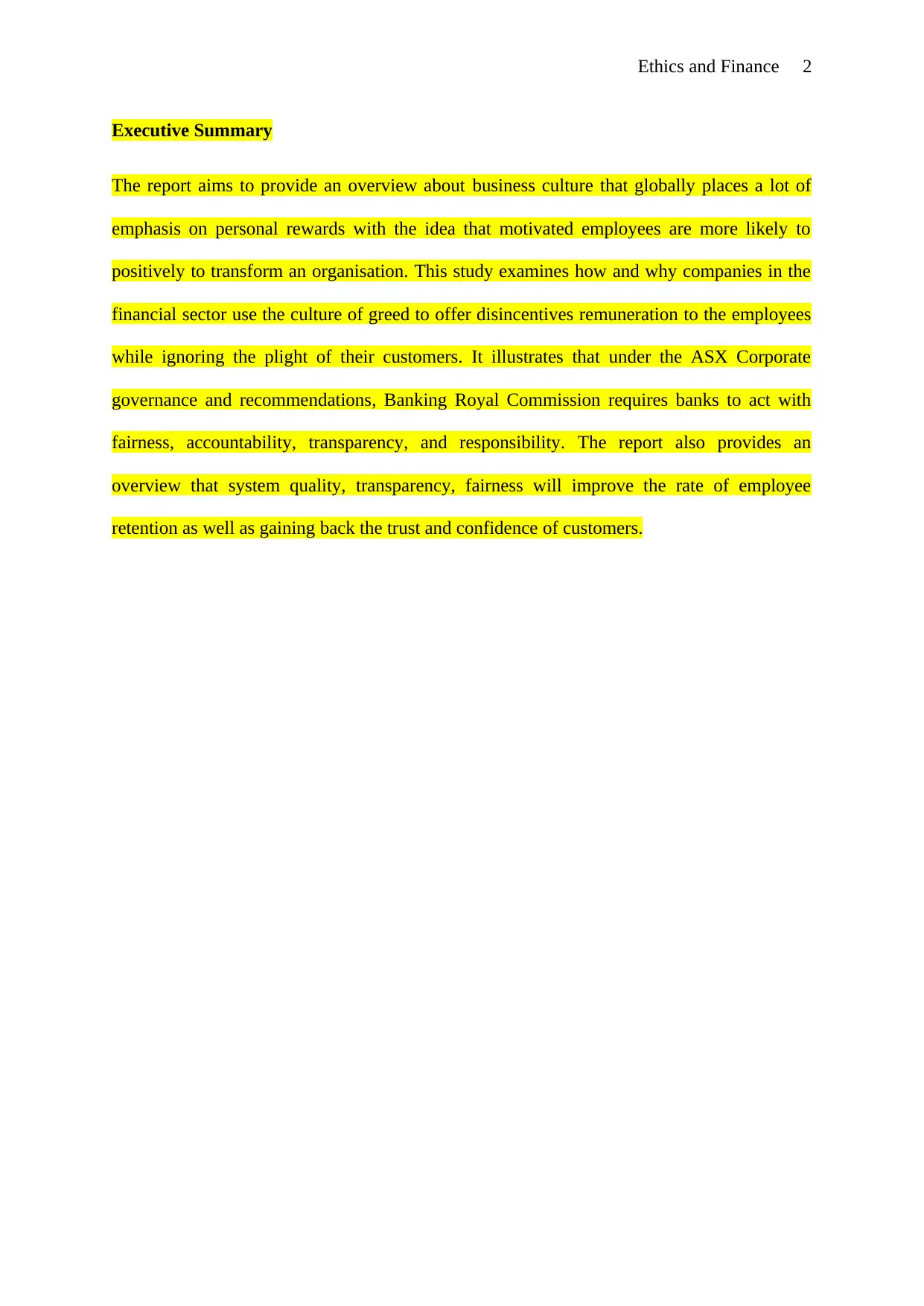
Ethics and Finance 2
Executive Summary
The report aims to provide an overview about business culture that globally places a lot of
emphasis on personal rewards with the idea that motivated employees are more likely to
positively to transform an organisation. This study examines how and why companies in the
financial sector use the culture of greed to offer disincentives remuneration to the employees
while ignoring the plight of their customers. It illustrates that under the ASX Corporate
governance and recommendations, Banking Royal Commission requires banks to act with
fairness, accountability, transparency, and responsibility. The report also provides an
overview that system quality, transparency, fairness will improve the rate of employee
retention as well as gaining back the trust and confidence of customers.
Executive Summary
The report aims to provide an overview about business culture that globally places a lot of
emphasis on personal rewards with the idea that motivated employees are more likely to
positively to transform an organisation. This study examines how and why companies in the
financial sector use the culture of greed to offer disincentives remuneration to the employees
while ignoring the plight of their customers. It illustrates that under the ASX Corporate
governance and recommendations, Banking Royal Commission requires banks to act with
fairness, accountability, transparency, and responsibility. The report also provides an
overview that system quality, transparency, fairness will improve the rate of employee
retention as well as gaining back the trust and confidence of customers.
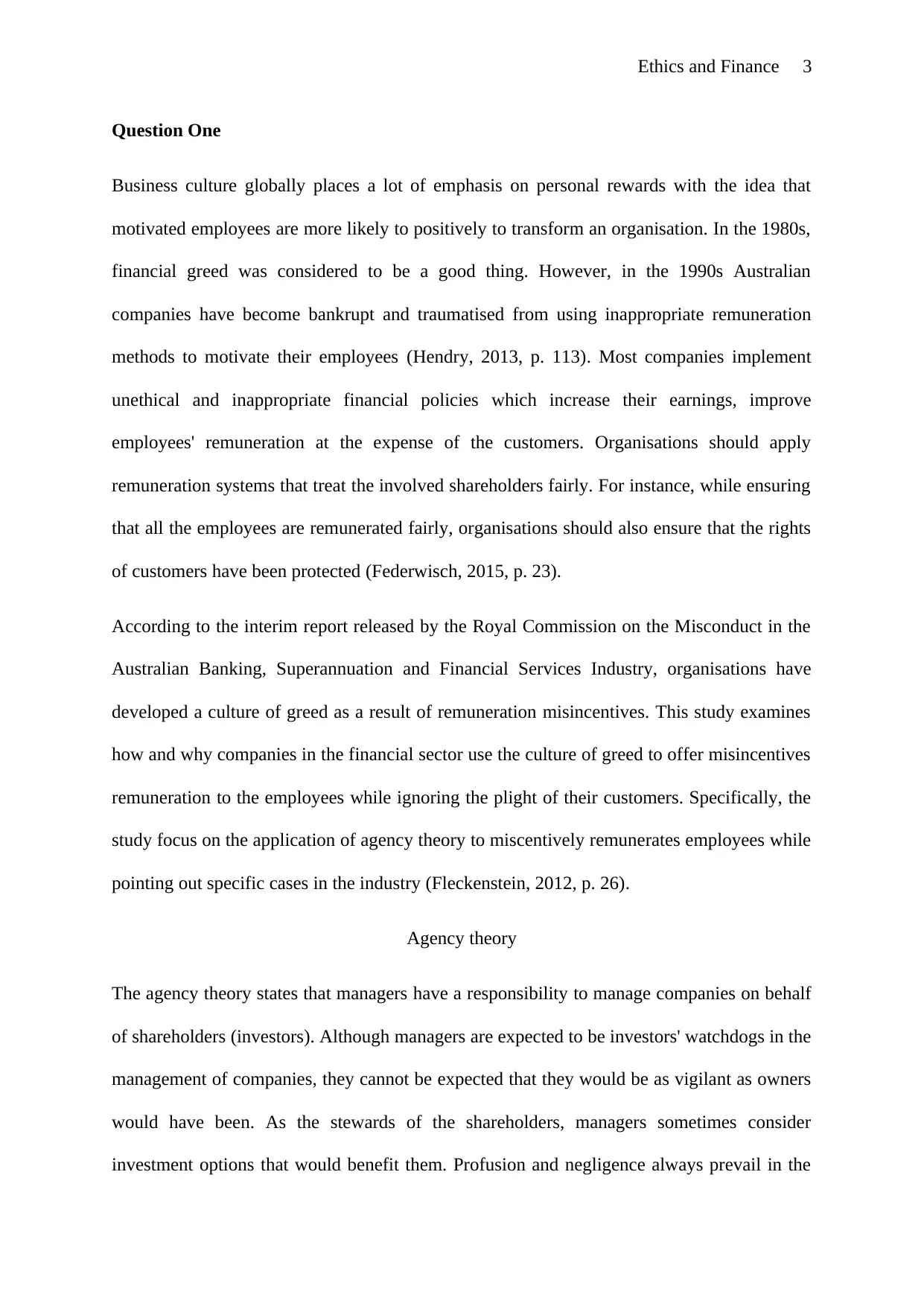
Ethics and Finance 3
Question One
Business culture globally places a lot of emphasis on personal rewards with the idea that
motivated employees are more likely to positively to transform an organisation. In the 1980s,
financial greed was considered to be a good thing. However, in the 1990s Australian
companies have become bankrupt and traumatised from using inappropriate remuneration
methods to motivate their employees (Hendry, 2013, p. 113). Most companies implement
unethical and inappropriate financial policies which increase their earnings, improve
employees' remuneration at the expense of the customers. Organisations should apply
remuneration systems that treat the involved shareholders fairly. For instance, while ensuring
that all the employees are remunerated fairly, organisations should also ensure that the rights
of customers have been protected (Federwisch, 2015, p. 23).
According to the interim report released by the Royal Commission on the Misconduct in the
Australian Banking, Superannuation and Financial Services Industry, organisations have
developed a culture of greed as a result of remuneration misincentives. This study examines
how and why companies in the financial sector use the culture of greed to offer misincentives
remuneration to the employees while ignoring the plight of their customers. Specifically, the
study focus on the application of agency theory to miscentively remunerates employees while
pointing out specific cases in the industry (Fleckenstein, 2012, p. 26).
Agency theory
The agency theory states that managers have a responsibility to manage companies on behalf
of shareholders (investors). Although managers are expected to be investors' watchdogs in the
management of companies, they cannot be expected that they would be as vigilant as owners
would have been. As the stewards of the shareholders, managers sometimes consider
investment options that would benefit them. Profusion and negligence always prevail in the
Question One
Business culture globally places a lot of emphasis on personal rewards with the idea that
motivated employees are more likely to positively to transform an organisation. In the 1980s,
financial greed was considered to be a good thing. However, in the 1990s Australian
companies have become bankrupt and traumatised from using inappropriate remuneration
methods to motivate their employees (Hendry, 2013, p. 113). Most companies implement
unethical and inappropriate financial policies which increase their earnings, improve
employees' remuneration at the expense of the customers. Organisations should apply
remuneration systems that treat the involved shareholders fairly. For instance, while ensuring
that all the employees are remunerated fairly, organisations should also ensure that the rights
of customers have been protected (Federwisch, 2015, p. 23).
According to the interim report released by the Royal Commission on the Misconduct in the
Australian Banking, Superannuation and Financial Services Industry, organisations have
developed a culture of greed as a result of remuneration misincentives. This study examines
how and why companies in the financial sector use the culture of greed to offer misincentives
remuneration to the employees while ignoring the plight of their customers. Specifically, the
study focus on the application of agency theory to miscentively remunerates employees while
pointing out specific cases in the industry (Fleckenstein, 2012, p. 26).
Agency theory
The agency theory states that managers have a responsibility to manage companies on behalf
of shareholders (investors). Although managers are expected to be investors' watchdogs in the
management of companies, they cannot be expected that they would be as vigilant as owners
would have been. As the stewards of the shareholders, managers sometimes consider
investment options that would benefit them. Profusion and negligence always prevail in the
⊘ This is a preview!⊘
Do you want full access?
Subscribe today to unlock all pages.

Trusted by 1+ million students worldwide
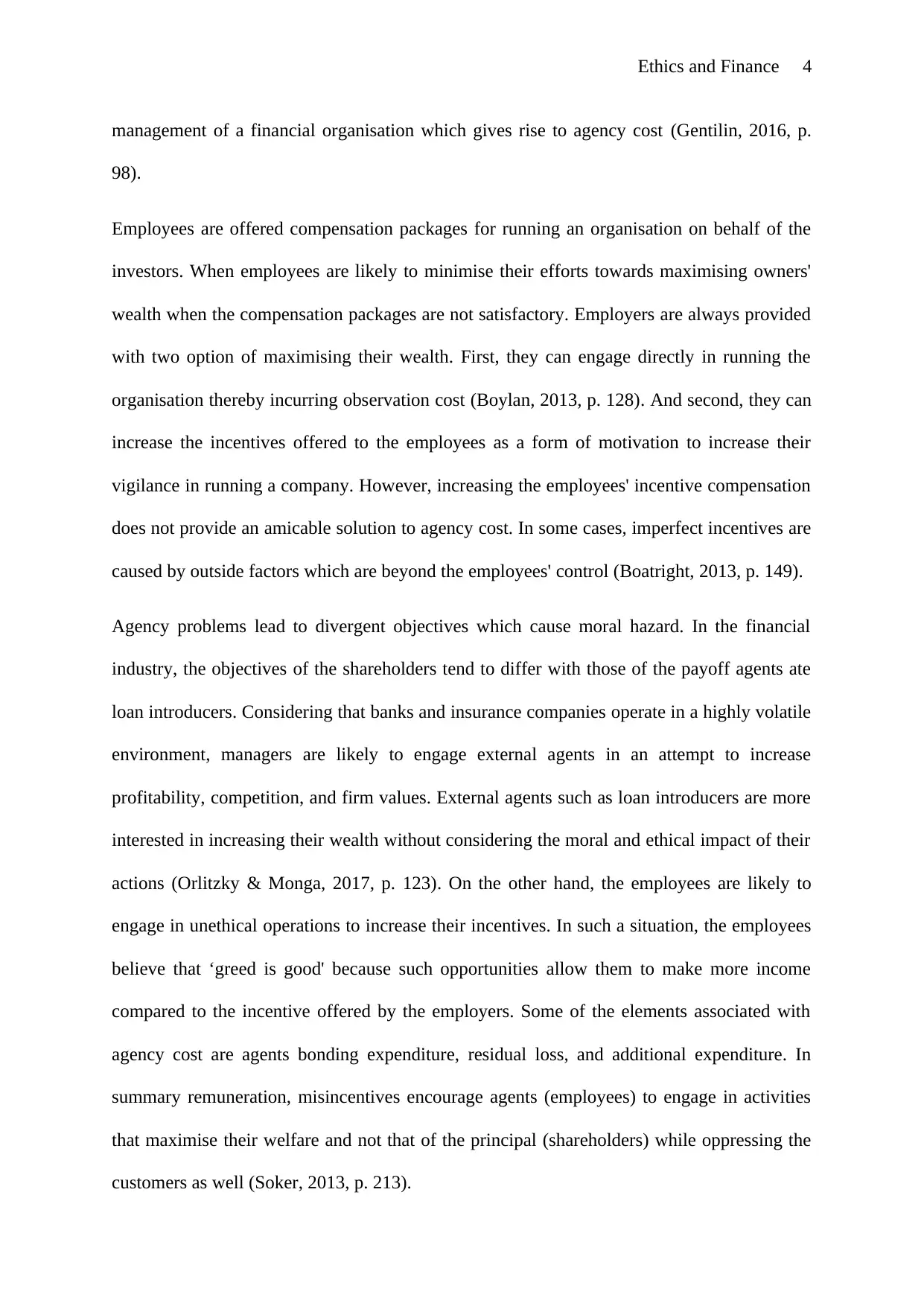
Ethics and Finance 4
management of a financial organisation which gives rise to agency cost (Gentilin, 2016, p.
98).
Employees are offered compensation packages for running an organisation on behalf of the
investors. When employees are likely to minimise their efforts towards maximising owners'
wealth when the compensation packages are not satisfactory. Employers are always provided
with two option of maximising their wealth. First, they can engage directly in running the
organisation thereby incurring observation cost (Boylan, 2013, p. 128). And second, they can
increase the incentives offered to the employees as a form of motivation to increase their
vigilance in running a company. However, increasing the employees' incentive compensation
does not provide an amicable solution to agency cost. In some cases, imperfect incentives are
caused by outside factors which are beyond the employees' control (Boatright, 2013, p. 149).
Agency problems lead to divergent objectives which cause moral hazard. In the financial
industry, the objectives of the shareholders tend to differ with those of the payoff agents ate
loan introducers. Considering that banks and insurance companies operate in a highly volatile
environment, managers are likely to engage external agents in an attempt to increase
profitability, competition, and firm values. External agents such as loan introducers are more
interested in increasing their wealth without considering the moral and ethical impact of their
actions (Orlitzky & Monga, 2017, p. 123). On the other hand, the employees are likely to
engage in unethical operations to increase their incentives. In such a situation, the employees
believe that ‘greed is good' because such opportunities allow them to make more income
compared to the incentive offered by the employers. Some of the elements associated with
agency cost are agents bonding expenditure, residual loss, and additional expenditure. In
summary remuneration, misincentives encourage agents (employees) to engage in activities
that maximise their welfare and not that of the principal (shareholders) while oppressing the
customers as well (Soker, 2013, p. 213).
management of a financial organisation which gives rise to agency cost (Gentilin, 2016, p.
98).
Employees are offered compensation packages for running an organisation on behalf of the
investors. When employees are likely to minimise their efforts towards maximising owners'
wealth when the compensation packages are not satisfactory. Employers are always provided
with two option of maximising their wealth. First, they can engage directly in running the
organisation thereby incurring observation cost (Boylan, 2013, p. 128). And second, they can
increase the incentives offered to the employees as a form of motivation to increase their
vigilance in running a company. However, increasing the employees' incentive compensation
does not provide an amicable solution to agency cost. In some cases, imperfect incentives are
caused by outside factors which are beyond the employees' control (Boatright, 2013, p. 149).
Agency problems lead to divergent objectives which cause moral hazard. In the financial
industry, the objectives of the shareholders tend to differ with those of the payoff agents ate
loan introducers. Considering that banks and insurance companies operate in a highly volatile
environment, managers are likely to engage external agents in an attempt to increase
profitability, competition, and firm values. External agents such as loan introducers are more
interested in increasing their wealth without considering the moral and ethical impact of their
actions (Orlitzky & Monga, 2017, p. 123). On the other hand, the employees are likely to
engage in unethical operations to increase their incentives. In such a situation, the employees
believe that ‘greed is good' because such opportunities allow them to make more income
compared to the incentive offered by the employers. Some of the elements associated with
agency cost are agents bonding expenditure, residual loss, and additional expenditure. In
summary remuneration, misincentives encourage agents (employees) to engage in activities
that maximise their welfare and not that of the principal (shareholders) while oppressing the
customers as well (Soker, 2013, p. 213).
Paraphrase This Document
Need a fresh take? Get an instant paraphrase of this document with our AI Paraphraser
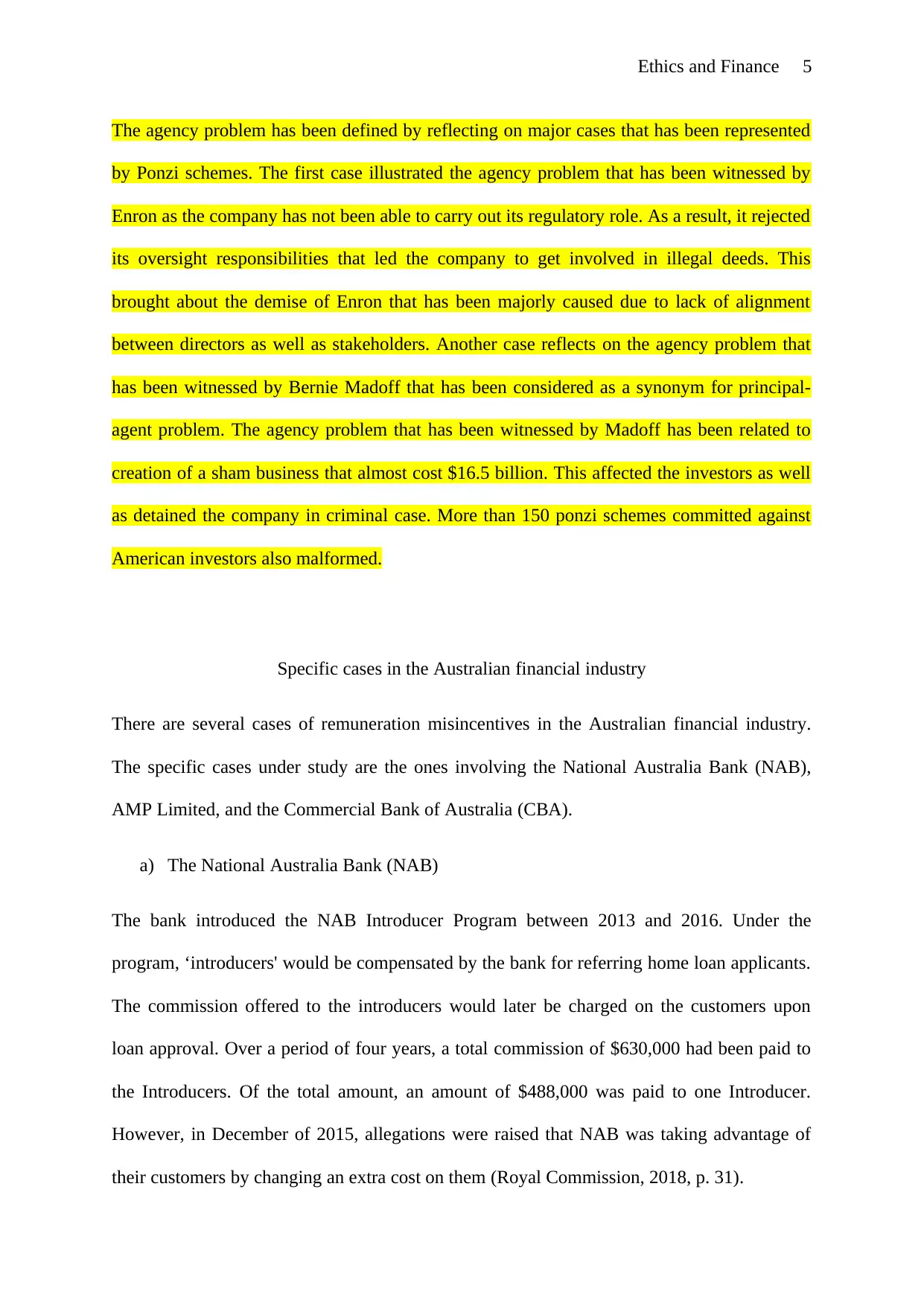
Ethics and Finance 5
The agency problem has been defined by reflecting on major cases that has been represented
by Ponzi schemes. The first case illustrated the agency problem that has been witnessed by
Enron as the company has not been able to carry out its regulatory role. As a result, it rejected
its oversight responsibilities that led the company to get involved in illegal deeds. This
brought about the demise of Enron that has been majorly caused due to lack of alignment
between directors as well as stakeholders. Another case reflects on the agency problem that
has been witnessed by Bernie Madoff that has been considered as a synonym for principal-
agent problem. The agency problem that has been witnessed by Madoff has been related to
creation of a sham business that almost cost $16.5 billion. This affected the investors as well
as detained the company in criminal case. More than 150 ponzi schemes committed against
American investors also malformed.
Specific cases in the Australian financial industry
There are several cases of remuneration misincentives in the Australian financial industry.
The specific cases under study are the ones involving the National Australia Bank (NAB),
AMP Limited, and the Commercial Bank of Australia (CBA).
a) The National Australia Bank (NAB)
The bank introduced the NAB Introducer Program between 2013 and 2016. Under the
program, ‘introducers' would be compensated by the bank for referring home loan applicants.
The commission offered to the introducers would later be charged on the customers upon
loan approval. Over a period of four years, a total commission of $630,000 had been paid to
the Introducers. Of the total amount, an amount of $488,000 was paid to one Introducer.
However, in December of 2015, allegations were raised that NAB was taking advantage of
their customers by changing an extra cost on them (Royal Commission, 2018, p. 31).
The agency problem has been defined by reflecting on major cases that has been represented
by Ponzi schemes. The first case illustrated the agency problem that has been witnessed by
Enron as the company has not been able to carry out its regulatory role. As a result, it rejected
its oversight responsibilities that led the company to get involved in illegal deeds. This
brought about the demise of Enron that has been majorly caused due to lack of alignment
between directors as well as stakeholders. Another case reflects on the agency problem that
has been witnessed by Bernie Madoff that has been considered as a synonym for principal-
agent problem. The agency problem that has been witnessed by Madoff has been related to
creation of a sham business that almost cost $16.5 billion. This affected the investors as well
as detained the company in criminal case. More than 150 ponzi schemes committed against
American investors also malformed.
Specific cases in the Australian financial industry
There are several cases of remuneration misincentives in the Australian financial industry.
The specific cases under study are the ones involving the National Australia Bank (NAB),
AMP Limited, and the Commercial Bank of Australia (CBA).
a) The National Australia Bank (NAB)
The bank introduced the NAB Introducer Program between 2013 and 2016. Under the
program, ‘introducers' would be compensated by the bank for referring home loan applicants.
The commission offered to the introducers would later be charged on the customers upon
loan approval. Over a period of four years, a total commission of $630,000 had been paid to
the Introducers. Of the total amount, an amount of $488,000 was paid to one Introducer.
However, in December of 2015, allegations were raised that NAB was taking advantage of
their customers by changing an extra cost on them (Royal Commission, 2018, p. 31).
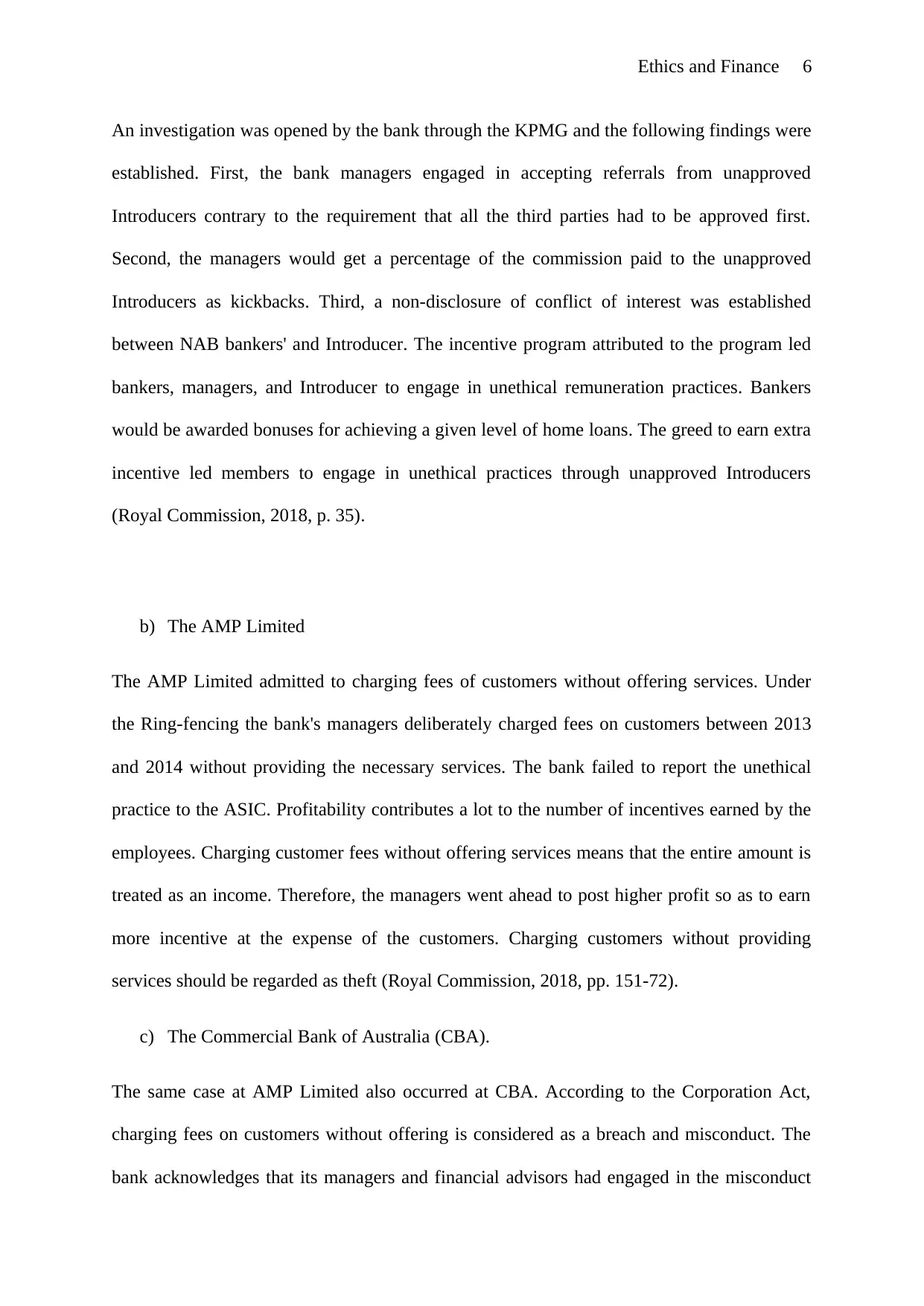
Ethics and Finance 6
An investigation was opened by the bank through the KPMG and the following findings were
established. First, the bank managers engaged in accepting referrals from unapproved
Introducers contrary to the requirement that all the third parties had to be approved first.
Second, the managers would get a percentage of the commission paid to the unapproved
Introducers as kickbacks. Third, a non-disclosure of conflict of interest was established
between NAB bankers' and Introducer. The incentive program attributed to the program led
bankers, managers, and Introducer to engage in unethical remuneration practices. Bankers
would be awarded bonuses for achieving a given level of home loans. The greed to earn extra
incentive led members to engage in unethical practices through unapproved Introducers
(Royal Commission, 2018, p. 35).
b) The AMP Limited
The AMP Limited admitted to charging fees of customers without offering services. Under
the Ring-fencing the bank's managers deliberately charged fees on customers between 2013
and 2014 without providing the necessary services. The bank failed to report the unethical
practice to the ASIC. Profitability contributes a lot to the number of incentives earned by the
employees. Charging customer fees without offering services means that the entire amount is
treated as an income. Therefore, the managers went ahead to post higher profit so as to earn
more incentive at the expense of the customers. Charging customers without providing
services should be regarded as theft (Royal Commission, 2018, pp. 151-72).
c) The Commercial Bank of Australia (CBA).
The same case at AMP Limited also occurred at CBA. According to the Corporation Act,
charging fees on customers without offering is considered as a breach and misconduct. The
bank acknowledges that its managers and financial advisors had engaged in the misconduct
An investigation was opened by the bank through the KPMG and the following findings were
established. First, the bank managers engaged in accepting referrals from unapproved
Introducers contrary to the requirement that all the third parties had to be approved first.
Second, the managers would get a percentage of the commission paid to the unapproved
Introducers as kickbacks. Third, a non-disclosure of conflict of interest was established
between NAB bankers' and Introducer. The incentive program attributed to the program led
bankers, managers, and Introducer to engage in unethical remuneration practices. Bankers
would be awarded bonuses for achieving a given level of home loans. The greed to earn extra
incentive led members to engage in unethical practices through unapproved Introducers
(Royal Commission, 2018, p. 35).
b) The AMP Limited
The AMP Limited admitted to charging fees of customers without offering services. Under
the Ring-fencing the bank's managers deliberately charged fees on customers between 2013
and 2014 without providing the necessary services. The bank failed to report the unethical
practice to the ASIC. Profitability contributes a lot to the number of incentives earned by the
employees. Charging customer fees without offering services means that the entire amount is
treated as an income. Therefore, the managers went ahead to post higher profit so as to earn
more incentive at the expense of the customers. Charging customers without providing
services should be regarded as theft (Royal Commission, 2018, pp. 151-72).
c) The Commercial Bank of Australia (CBA).
The same case at AMP Limited also occurred at CBA. According to the Corporation Act,
charging fees on customers without offering is considered as a breach and misconduct. The
bank acknowledges that its managers and financial advisors had engaged in the misconduct
⊘ This is a preview!⊘
Do you want full access?
Subscribe today to unlock all pages.

Trusted by 1+ million students worldwide
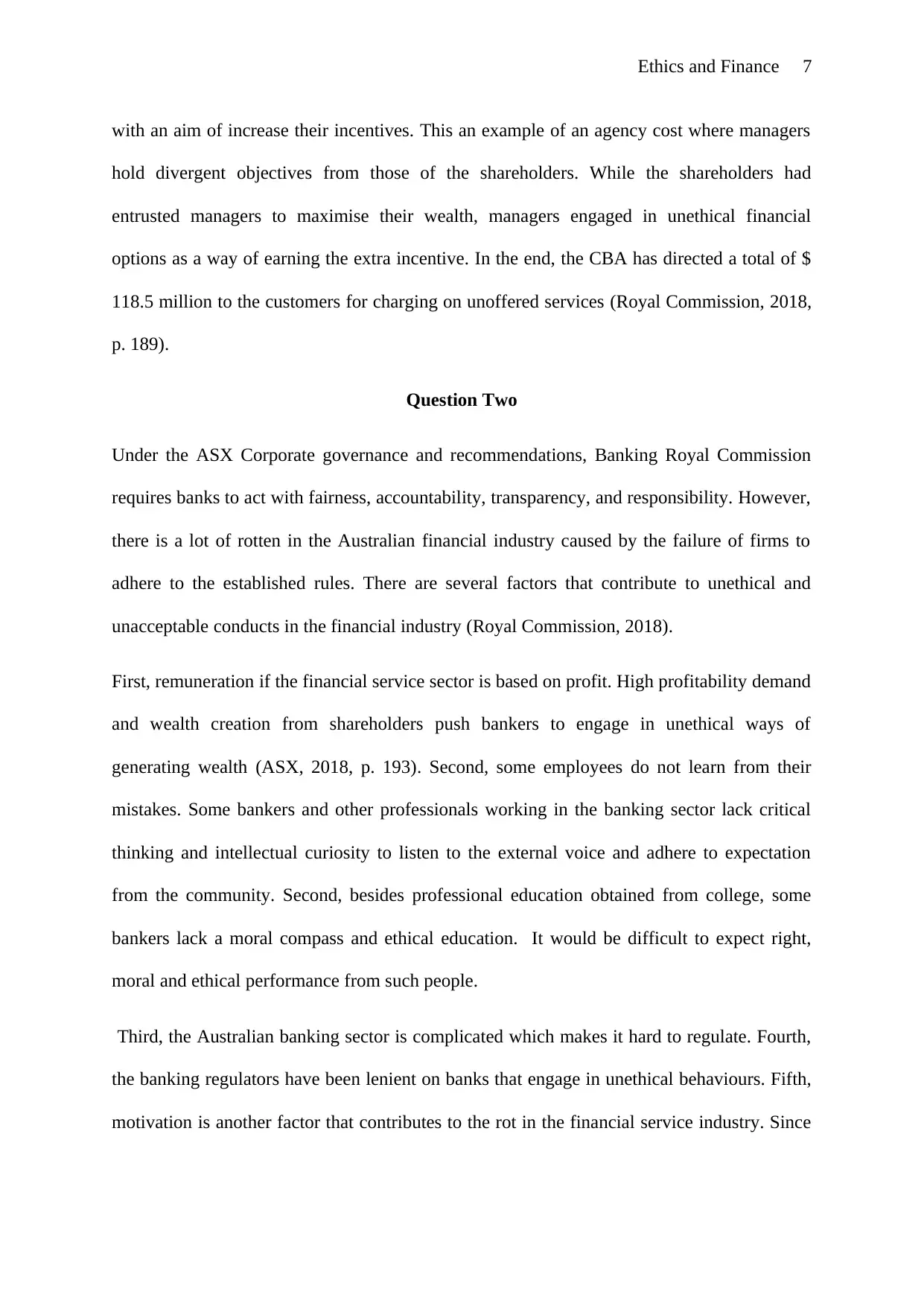
Ethics and Finance 7
with an aim of increase their incentives. This an example of an agency cost where managers
hold divergent objectives from those of the shareholders. While the shareholders had
entrusted managers to maximise their wealth, managers engaged in unethical financial
options as a way of earning the extra incentive. In the end, the CBA has directed a total of $
118.5 million to the customers for charging on unoffered services (Royal Commission, 2018,
p. 189).
Question Two
Under the ASX Corporate governance and recommendations, Banking Royal Commission
requires banks to act with fairness, accountability, transparency, and responsibility. However,
there is a lot of rotten in the Australian financial industry caused by the failure of firms to
adhere to the established rules. There are several factors that contribute to unethical and
unacceptable conducts in the financial industry (Royal Commission, 2018).
First, remuneration if the financial service sector is based on profit. High profitability demand
and wealth creation from shareholders push bankers to engage in unethical ways of
generating wealth (ASX, 2018, p. 193). Second, some employees do not learn from their
mistakes. Some bankers and other professionals working in the banking sector lack critical
thinking and intellectual curiosity to listen to the external voice and adhere to expectation
from the community. Second, besides professional education obtained from college, some
bankers lack a moral compass and ethical education. It would be difficult to expect right,
moral and ethical performance from such people.
Third, the Australian banking sector is complicated which makes it hard to regulate. Fourth,
the banking regulators have been lenient on banks that engage in unethical behaviours. Fifth,
motivation is another factor that contributes to the rot in the financial service industry. Since
with an aim of increase their incentives. This an example of an agency cost where managers
hold divergent objectives from those of the shareholders. While the shareholders had
entrusted managers to maximise their wealth, managers engaged in unethical financial
options as a way of earning the extra incentive. In the end, the CBA has directed a total of $
118.5 million to the customers for charging on unoffered services (Royal Commission, 2018,
p. 189).
Question Two
Under the ASX Corporate governance and recommendations, Banking Royal Commission
requires banks to act with fairness, accountability, transparency, and responsibility. However,
there is a lot of rotten in the Australian financial industry caused by the failure of firms to
adhere to the established rules. There are several factors that contribute to unethical and
unacceptable conducts in the financial industry (Royal Commission, 2018).
First, remuneration if the financial service sector is based on profit. High profitability demand
and wealth creation from shareholders push bankers to engage in unethical ways of
generating wealth (ASX, 2018, p. 193). Second, some employees do not learn from their
mistakes. Some bankers and other professionals working in the banking sector lack critical
thinking and intellectual curiosity to listen to the external voice and adhere to expectation
from the community. Second, besides professional education obtained from college, some
bankers lack a moral compass and ethical education. It would be difficult to expect right,
moral and ethical performance from such people.
Third, the Australian banking sector is complicated which makes it hard to regulate. Fourth,
the banking regulators have been lenient on banks that engage in unethical behaviours. Fifth,
motivation is another factor that contributes to the rot in the financial service industry. Since
Paraphrase This Document
Need a fresh take? Get an instant paraphrase of this document with our AI Paraphraser
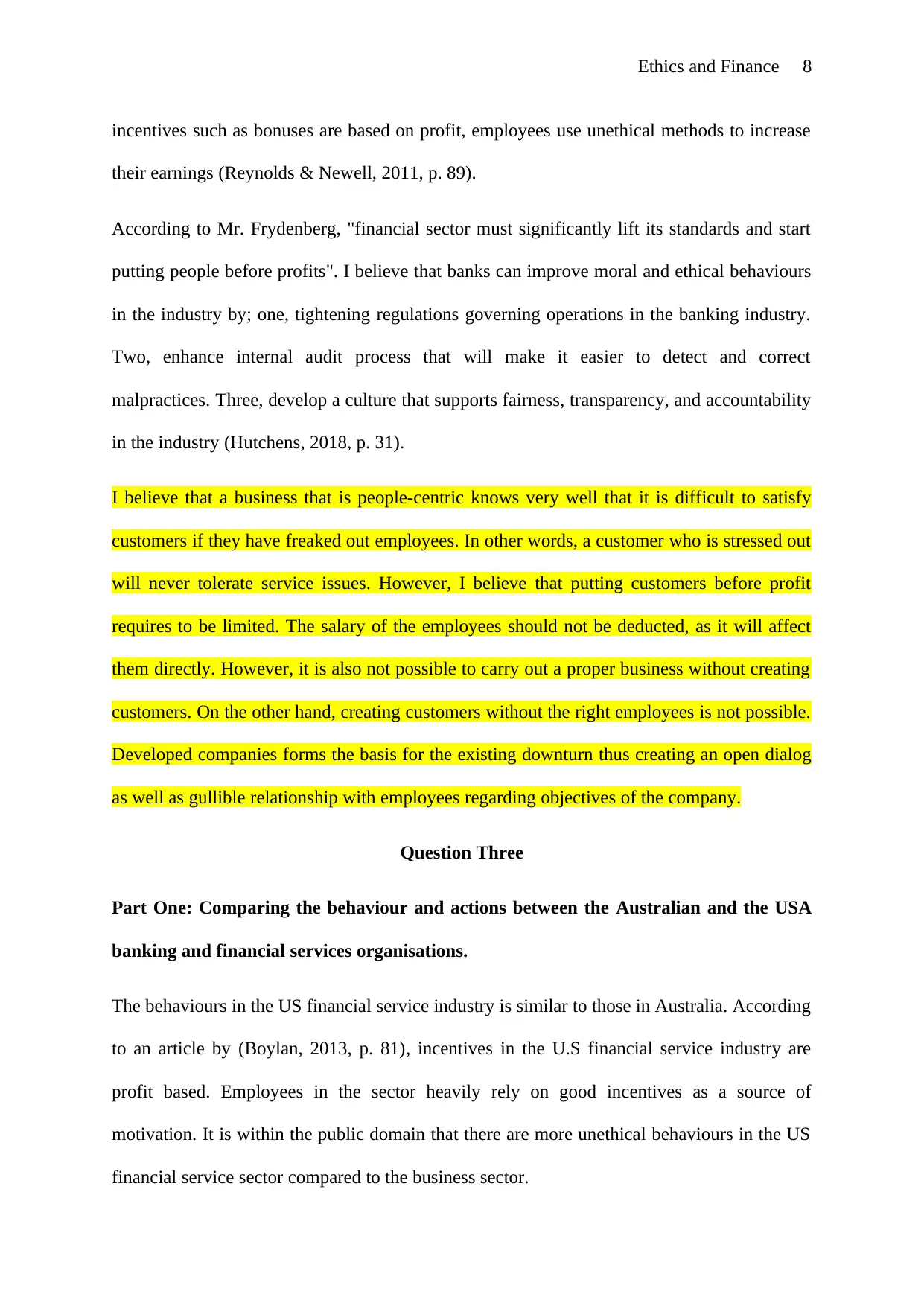
Ethics and Finance 8
incentives such as bonuses are based on profit, employees use unethical methods to increase
their earnings (Reynolds & Newell, 2011, p. 89).
According to Mr. Frydenberg, "financial sector must significantly lift its standards and start
putting people before profits". I believe that banks can improve moral and ethical behaviours
in the industry by; one, tightening regulations governing operations in the banking industry.
Two, enhance internal audit process that will make it easier to detect and correct
malpractices. Three, develop a culture that supports fairness, transparency, and accountability
in the industry (Hutchens, 2018, p. 31).
I believe that a business that is people-centric knows very well that it is difficult to satisfy
customers if they have freaked out employees. In other words, a customer who is stressed out
will never tolerate service issues. However, I believe that putting customers before profit
requires to be limited. The salary of the employees should not be deducted, as it will affect
them directly. However, it is also not possible to carry out a proper business without creating
customers. On the other hand, creating customers without the right employees is not possible.
Developed companies forms the basis for the existing downturn thus creating an open dialog
as well as gullible relationship with employees regarding objectives of the company.
Question Three
Part One: Comparing the behaviour and actions between the Australian and the USA
banking and financial services organisations.
The behaviours in the US financial service industry is similar to those in Australia. According
to an article by (Boylan, 2013, p. 81), incentives in the U.S financial service industry are
profit based. Employees in the sector heavily rely on good incentives as a source of
motivation. It is within the public domain that there are more unethical behaviours in the US
financial service sector compared to the business sector.
incentives such as bonuses are based on profit, employees use unethical methods to increase
their earnings (Reynolds & Newell, 2011, p. 89).
According to Mr. Frydenberg, "financial sector must significantly lift its standards and start
putting people before profits". I believe that banks can improve moral and ethical behaviours
in the industry by; one, tightening regulations governing operations in the banking industry.
Two, enhance internal audit process that will make it easier to detect and correct
malpractices. Three, develop a culture that supports fairness, transparency, and accountability
in the industry (Hutchens, 2018, p. 31).
I believe that a business that is people-centric knows very well that it is difficult to satisfy
customers if they have freaked out employees. In other words, a customer who is stressed out
will never tolerate service issues. However, I believe that putting customers before profit
requires to be limited. The salary of the employees should not be deducted, as it will affect
them directly. However, it is also not possible to carry out a proper business without creating
customers. On the other hand, creating customers without the right employees is not possible.
Developed companies forms the basis for the existing downturn thus creating an open dialog
as well as gullible relationship with employees regarding objectives of the company.
Question Three
Part One: Comparing the behaviour and actions between the Australian and the USA
banking and financial services organisations.
The behaviours in the US financial service industry is similar to those in Australia. According
to an article by (Boylan, 2013, p. 81), incentives in the U.S financial service industry are
profit based. Employees in the sector heavily rely on good incentives as a source of
motivation. It is within the public domain that there are more unethical behaviours in the US
financial service sector compared to the business sector.
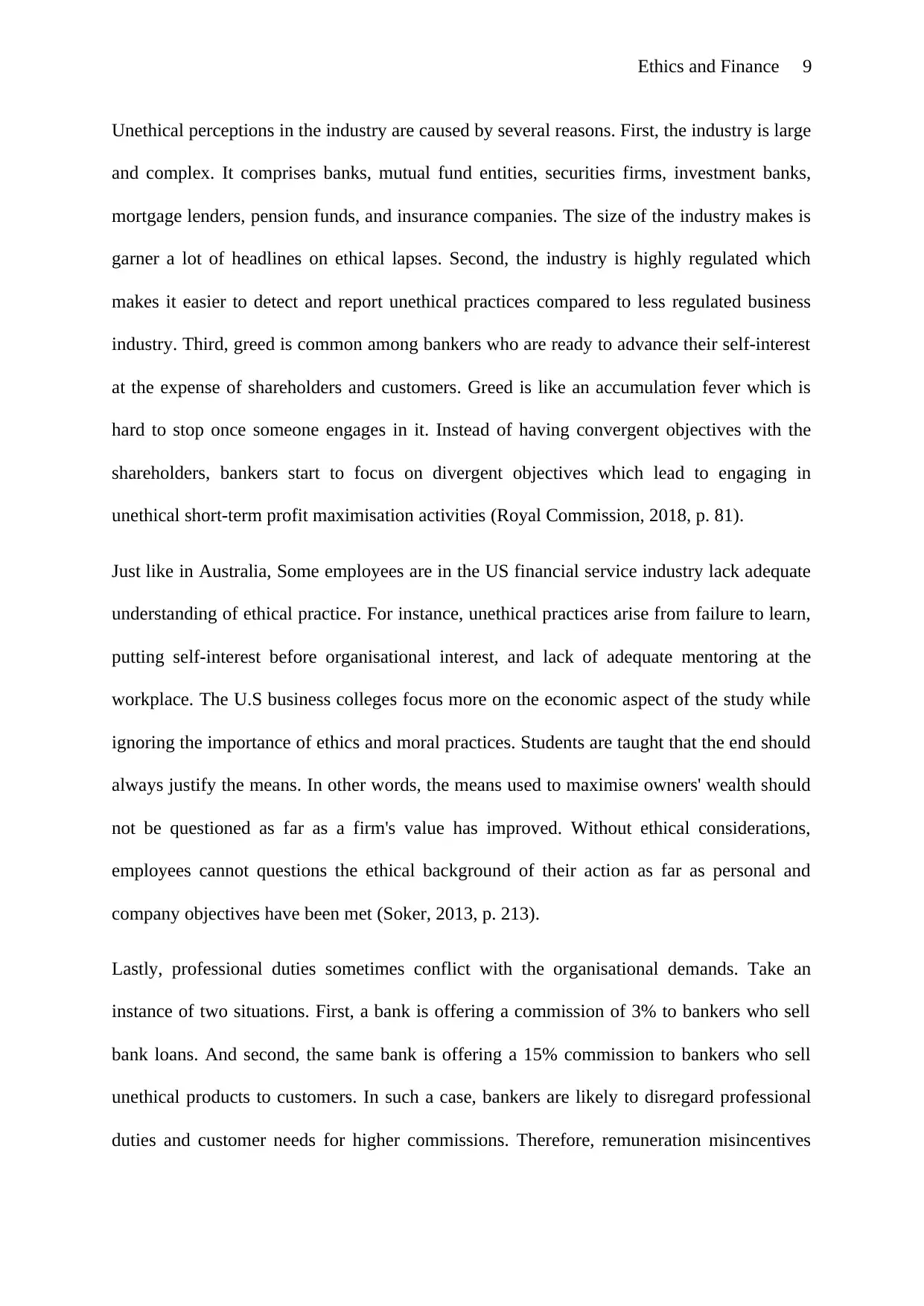
Ethics and Finance 9
Unethical perceptions in the industry are caused by several reasons. First, the industry is large
and complex. It comprises banks, mutual fund entities, securities firms, investment banks,
mortgage lenders, pension funds, and insurance companies. The size of the industry makes is
garner a lot of headlines on ethical lapses. Second, the industry is highly regulated which
makes it easier to detect and report unethical practices compared to less regulated business
industry. Third, greed is common among bankers who are ready to advance their self-interest
at the expense of shareholders and customers. Greed is like an accumulation fever which is
hard to stop once someone engages in it. Instead of having convergent objectives with the
shareholders, bankers start to focus on divergent objectives which lead to engaging in
unethical short-term profit maximisation activities (Royal Commission, 2018, p. 81).
Just like in Australia, Some employees are in the US financial service industry lack adequate
understanding of ethical practice. For instance, unethical practices arise from failure to learn,
putting self-interest before organisational interest, and lack of adequate mentoring at the
workplace. The U.S business colleges focus more on the economic aspect of the study while
ignoring the importance of ethics and moral practices. Students are taught that the end should
always justify the means. In other words, the means used to maximise owners' wealth should
not be questioned as far as a firm's value has improved. Without ethical considerations,
employees cannot questions the ethical background of their action as far as personal and
company objectives have been met (Soker, 2013, p. 213).
Lastly, professional duties sometimes conflict with the organisational demands. Take an
instance of two situations. First, a bank is offering a commission of 3% to bankers who sell
bank loans. And second, the same bank is offering a 15% commission to bankers who sell
unethical products to customers. In such a case, bankers are likely to disregard professional
duties and customer needs for higher commissions. Therefore, remuneration misincentives
Unethical perceptions in the industry are caused by several reasons. First, the industry is large
and complex. It comprises banks, mutual fund entities, securities firms, investment banks,
mortgage lenders, pension funds, and insurance companies. The size of the industry makes is
garner a lot of headlines on ethical lapses. Second, the industry is highly regulated which
makes it easier to detect and report unethical practices compared to less regulated business
industry. Third, greed is common among bankers who are ready to advance their self-interest
at the expense of shareholders and customers. Greed is like an accumulation fever which is
hard to stop once someone engages in it. Instead of having convergent objectives with the
shareholders, bankers start to focus on divergent objectives which lead to engaging in
unethical short-term profit maximisation activities (Royal Commission, 2018, p. 81).
Just like in Australia, Some employees are in the US financial service industry lack adequate
understanding of ethical practice. For instance, unethical practices arise from failure to learn,
putting self-interest before organisational interest, and lack of adequate mentoring at the
workplace. The U.S business colleges focus more on the economic aspect of the study while
ignoring the importance of ethics and moral practices. Students are taught that the end should
always justify the means. In other words, the means used to maximise owners' wealth should
not be questioned as far as a firm's value has improved. Without ethical considerations,
employees cannot questions the ethical background of their action as far as personal and
company objectives have been met (Soker, 2013, p. 213).
Lastly, professional duties sometimes conflict with the organisational demands. Take an
instance of two situations. First, a bank is offering a commission of 3% to bankers who sell
bank loans. And second, the same bank is offering a 15% commission to bankers who sell
unethical products to customers. In such a case, bankers are likely to disregard professional
duties and customer needs for higher commissions. Therefore, remuneration misincentives
⊘ This is a preview!⊘
Do you want full access?
Subscribe today to unlock all pages.

Trusted by 1+ million students worldwide
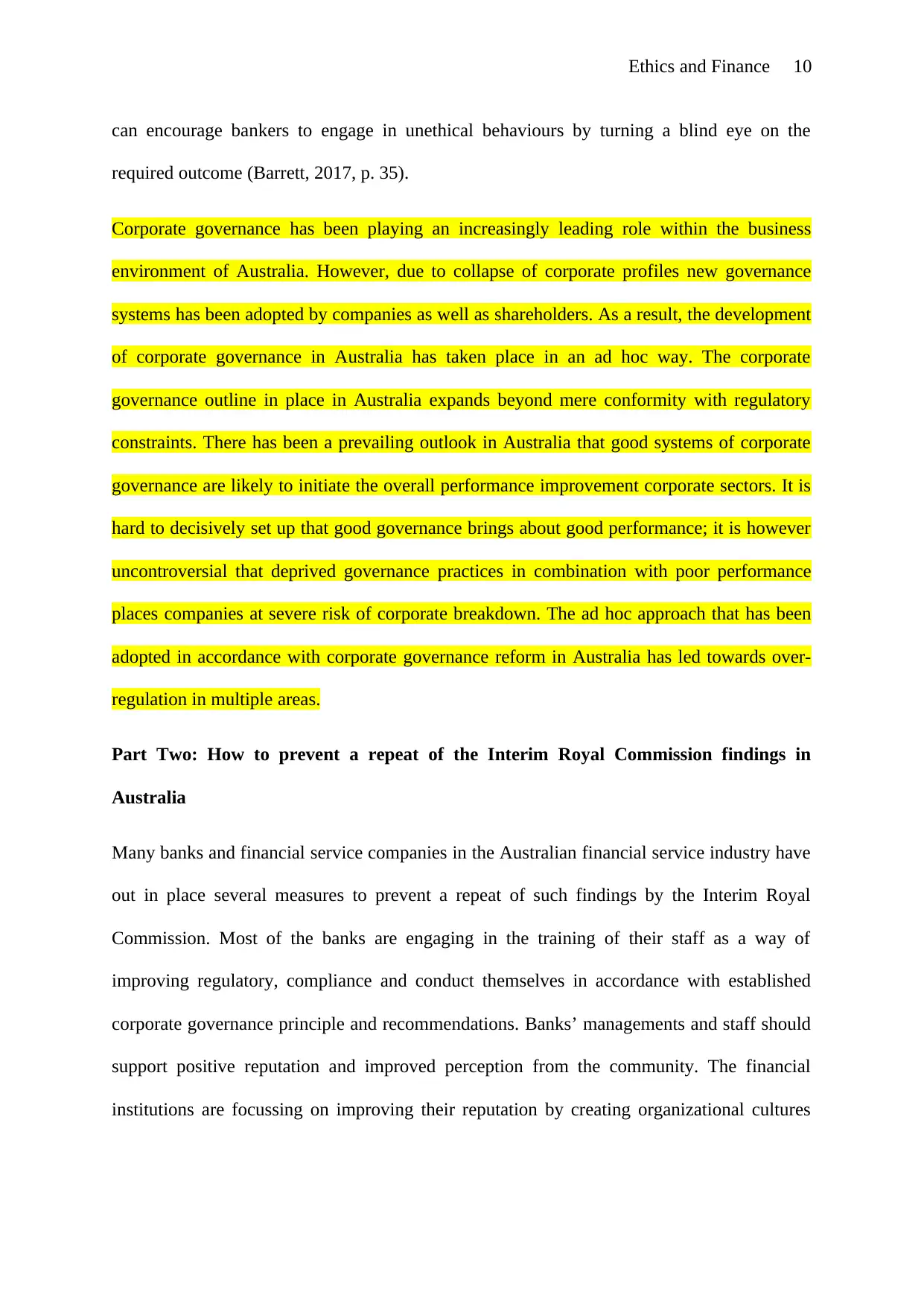
Ethics and Finance 10
can encourage bankers to engage in unethical behaviours by turning a blind eye on the
required outcome (Barrett, 2017, p. 35).
Corporate governance has been playing an increasingly leading role within the business
environment of Australia. However, due to collapse of corporate profiles new governance
systems has been adopted by companies as well as shareholders. As a result, the development
of corporate governance in Australia has taken place in an ad hoc way. The corporate
governance outline in place in Australia expands beyond mere conformity with regulatory
constraints. There has been a prevailing outlook in Australia that good systems of corporate
governance are likely to initiate the overall performance improvement corporate sectors. It is
hard to decisively set up that good governance brings about good performance; it is however
uncontroversial that deprived governance practices in combination with poor performance
places companies at severe risk of corporate breakdown. The ad hoc approach that has been
adopted in accordance with corporate governance reform in Australia has led towards over-
regulation in multiple areas.
Part Two: How to prevent a repeat of the Interim Royal Commission findings in
Australia
Many banks and financial service companies in the Australian financial service industry have
out in place several measures to prevent a repeat of such findings by the Interim Royal
Commission. Most of the banks are engaging in the training of their staff as a way of
improving regulatory, compliance and conduct themselves in accordance with established
corporate governance principle and recommendations. Banks’ managements and staff should
support positive reputation and improved perception from the community. The financial
institutions are focussing on improving their reputation by creating organizational cultures
can encourage bankers to engage in unethical behaviours by turning a blind eye on the
required outcome (Barrett, 2017, p. 35).
Corporate governance has been playing an increasingly leading role within the business
environment of Australia. However, due to collapse of corporate profiles new governance
systems has been adopted by companies as well as shareholders. As a result, the development
of corporate governance in Australia has taken place in an ad hoc way. The corporate
governance outline in place in Australia expands beyond mere conformity with regulatory
constraints. There has been a prevailing outlook in Australia that good systems of corporate
governance are likely to initiate the overall performance improvement corporate sectors. It is
hard to decisively set up that good governance brings about good performance; it is however
uncontroversial that deprived governance practices in combination with poor performance
places companies at severe risk of corporate breakdown. The ad hoc approach that has been
adopted in accordance with corporate governance reform in Australia has led towards over-
regulation in multiple areas.
Part Two: How to prevent a repeat of the Interim Royal Commission findings in
Australia
Many banks and financial service companies in the Australian financial service industry have
out in place several measures to prevent a repeat of such findings by the Interim Royal
Commission. Most of the banks are engaging in the training of their staff as a way of
improving regulatory, compliance and conduct themselves in accordance with established
corporate governance principle and recommendations. Banks’ managements and staff should
support positive reputation and improved perception from the community. The financial
institutions are focussing on improving their reputation by creating organizational cultures
Paraphrase This Document
Need a fresh take? Get an instant paraphrase of this document with our AI Paraphraser
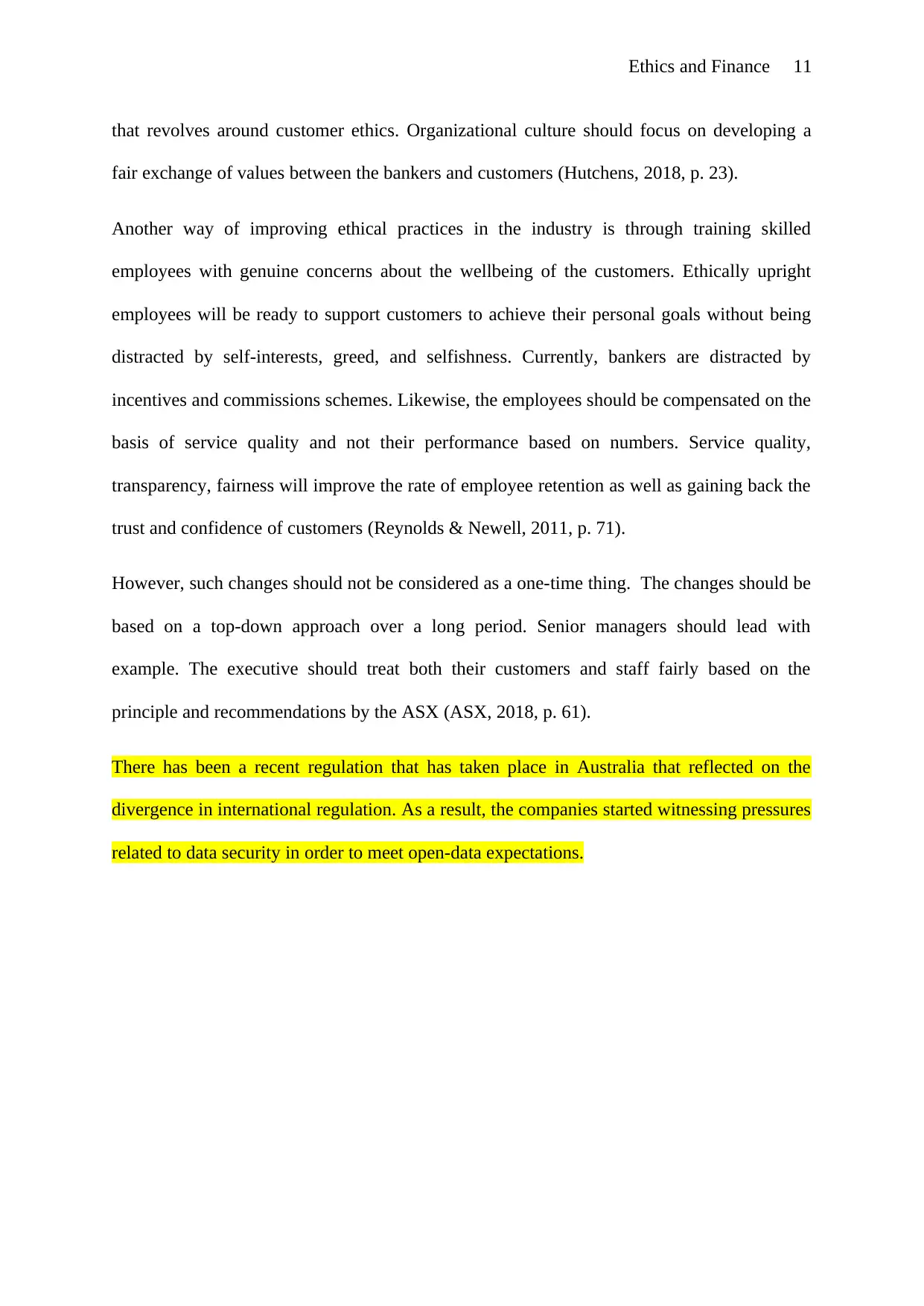
Ethics and Finance 11
that revolves around customer ethics. Organizational culture should focus on developing a
fair exchange of values between the bankers and customers (Hutchens, 2018, p. 23).
Another way of improving ethical practices in the industry is through training skilled
employees with genuine concerns about the wellbeing of the customers. Ethically upright
employees will be ready to support customers to achieve their personal goals without being
distracted by self-interests, greed, and selfishness. Currently, bankers are distracted by
incentives and commissions schemes. Likewise, the employees should be compensated on the
basis of service quality and not their performance based on numbers. Service quality,
transparency, fairness will improve the rate of employee retention as well as gaining back the
trust and confidence of customers (Reynolds & Newell, 2011, p. 71).
However, such changes should not be considered as a one-time thing. The changes should be
based on a top-down approach over a long period. Senior managers should lead with
example. The executive should treat both their customers and staff fairly based on the
principle and recommendations by the ASX (ASX, 2018, p. 61).
There has been a recent regulation that has taken place in Australia that reflected on the
divergence in international regulation. As a result, the companies started witnessing pressures
related to data security in order to meet open-data expectations.
that revolves around customer ethics. Organizational culture should focus on developing a
fair exchange of values between the bankers and customers (Hutchens, 2018, p. 23).
Another way of improving ethical practices in the industry is through training skilled
employees with genuine concerns about the wellbeing of the customers. Ethically upright
employees will be ready to support customers to achieve their personal goals without being
distracted by self-interests, greed, and selfishness. Currently, bankers are distracted by
incentives and commissions schemes. Likewise, the employees should be compensated on the
basis of service quality and not their performance based on numbers. Service quality,
transparency, fairness will improve the rate of employee retention as well as gaining back the
trust and confidence of customers (Reynolds & Newell, 2011, p. 71).
However, such changes should not be considered as a one-time thing. The changes should be
based on a top-down approach over a long period. Senior managers should lead with
example. The executive should treat both their customers and staff fairly based on the
principle and recommendations by the ASX (ASX, 2018, p. 61).
There has been a recent regulation that has taken place in Australia that reflected on the
divergence in international regulation. As a result, the companies started witnessing pressures
related to data security in order to meet open-data expectations.
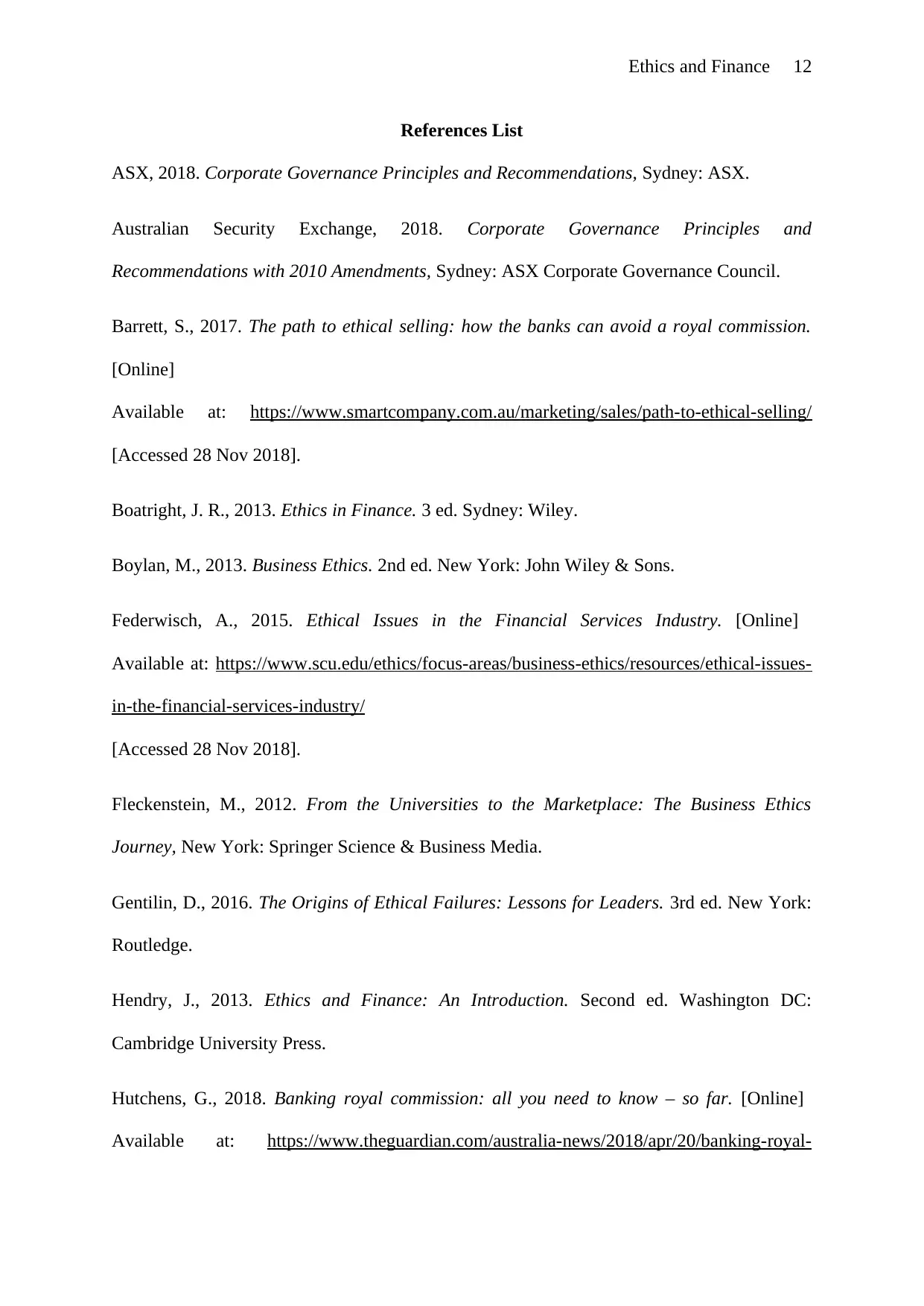
Ethics and Finance 12
References List
ASX, 2018. Corporate Governance Principles and Recommendations, Sydney: ASX.
Australian Security Exchange, 2018. Corporate Governance Principles and
Recommendations with 2010 Amendments, Sydney: ASX Corporate Governance Council.
Barrett, S., 2017. The path to ethical selling: how the banks can avoid a royal commission.
[Online]
Available at: https://www.smartcompany.com.au/marketing/sales/path-to-ethical-selling/
[Accessed 28 Nov 2018].
Boatright, J. R., 2013. Ethics in Finance. 3 ed. Sydney: Wiley.
Boylan, M., 2013. Business Ethics. 2nd ed. New York: John Wiley & Sons.
Federwisch, A., 2015. Ethical Issues in the Financial Services Industry. [Online]
Available at: https://www.scu.edu/ethics/focus-areas/business-ethics/resources/ethical-issues-
in-the-financial-services-industry/
[Accessed 28 Nov 2018].
Fleckenstein, M., 2012. From the Universities to the Marketplace: The Business Ethics
Journey, New York: Springer Science & Business Media.
Gentilin, D., 2016. The Origins of Ethical Failures: Lessons for Leaders. 3rd ed. New York:
Routledge.
Hendry, J., 2013. Ethics and Finance: An Introduction. Second ed. Washington DC:
Cambridge University Press.
Hutchens, G., 2018. Banking royal commission: all you need to know – so far. [Online]
Available at: https://www.theguardian.com/australia-news/2018/apr/20/banking-royal-
References List
ASX, 2018. Corporate Governance Principles and Recommendations, Sydney: ASX.
Australian Security Exchange, 2018. Corporate Governance Principles and
Recommendations with 2010 Amendments, Sydney: ASX Corporate Governance Council.
Barrett, S., 2017. The path to ethical selling: how the banks can avoid a royal commission.
[Online]
Available at: https://www.smartcompany.com.au/marketing/sales/path-to-ethical-selling/
[Accessed 28 Nov 2018].
Boatright, J. R., 2013. Ethics in Finance. 3 ed. Sydney: Wiley.
Boylan, M., 2013. Business Ethics. 2nd ed. New York: John Wiley & Sons.
Federwisch, A., 2015. Ethical Issues in the Financial Services Industry. [Online]
Available at: https://www.scu.edu/ethics/focus-areas/business-ethics/resources/ethical-issues-
in-the-financial-services-industry/
[Accessed 28 Nov 2018].
Fleckenstein, M., 2012. From the Universities to the Marketplace: The Business Ethics
Journey, New York: Springer Science & Business Media.
Gentilin, D., 2016. The Origins of Ethical Failures: Lessons for Leaders. 3rd ed. New York:
Routledge.
Hendry, J., 2013. Ethics and Finance: An Introduction. Second ed. Washington DC:
Cambridge University Press.
Hutchens, G., 2018. Banking royal commission: all you need to know – so far. [Online]
Available at: https://www.theguardian.com/australia-news/2018/apr/20/banking-royal-
⊘ This is a preview!⊘
Do you want full access?
Subscribe today to unlock all pages.

Trusted by 1+ million students worldwide
1 out of 13
Related Documents
Your All-in-One AI-Powered Toolkit for Academic Success.
+13062052269
info@desklib.com
Available 24*7 on WhatsApp / Email
![[object Object]](/_next/static/media/star-bottom.7253800d.svg)
Unlock your academic potential
Copyright © 2020–2026 A2Z Services. All Rights Reserved. Developed and managed by ZUCOL.





